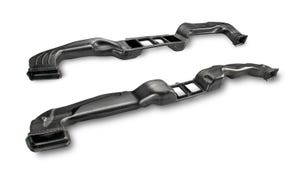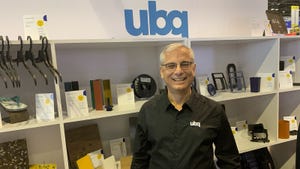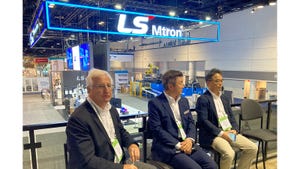The view from the heartland
Executive Q&A with Robert Janeczko: Robert Janeczko doesn’t need a bailout. He’d just like to get on with business and make sure that Washington understands the challenges of manufacturing in 21st-century America.
January 13, 2009
Executive Q&A with Robert Janeczko: Robert Janeczko doesn’t need a bailout. He’d just like to get on with business and make sure that Washington understands the challenges of manufacturing in 21st-century America.
There are 100 U.S. senators, and on Oct. 16, 2008, one of them, Senator Charles Grassley (R-Iowa), visited i2tech, a 113,000-ft custom injection molding facility in West Des Moines, IA. Robert Janeczko, i2tech’s president, had invited Grassley to the plant during a visit to Grassley’s Washington D.C. office in September while attending an SPI meeting.
MPW: Were you surprised that Senator Grassley accepted your invitation? 
Robert Janeczko
Robert Janeczko
Janeczko: My surprise was at his quickness in responding to my invitation. I expected him to come, but was amazed that he was here three weeks after I’d invited him. I have two senators, Tom Harkin being the other one, and I need to get him into our factory as well to express our concerns about a strong U.S. manufacturing base.
He really wanted to gather information for a speech he’s giving on the Senate floor. He said he likes to talk to working people. He was very approachable, and even held a town hall meeting with 40 of our employees.
MPW: Many in the industry want the government to take various actions to save manufacturing. What did you ask Sen. Grassley?
Janeczko: I’m the opposite. I didn’t really ask for anything too specific. I’m asking them to ease off on taxation. There’s a lot of push for China currency devaluation, tariffs—a lot of complex issues. One of the things he favors is a tariff on ethanol coming from Brazil to protect Iowa’s ethanol industry. These trade balance issues and negotiations are very complicated. NAFTA, for example, may get tweaked, but it won’t go away. What I did for Sen. Grassley was to spell out the 11 taxes that i2tech pays—and that’s not just federal but our total tax burden, which includes school tax, utility taxes, fuel taxes, etc., and gave him the amount of taxes we’re paying. He needs to keep total business taxation in perspective. So we talked about taxation and manufacturing in general.
MPW: Did he get it?
Janeczko: Sen. Grassley has an agriculture background, and while you don’t think of agriculture being manufacturing because it’s done outdoors—we have a preconceived notion that manufacturing has to be in a building—he’s a producer. He takes raw materials, and uses technology to grow and harvest his product, and then sells it. He’s producing something the same as we are. So he understands producer inputs and costs, and the need to maintain the vitality of manufacturing in the Midwest. He’s extremely knowledgeable about manufacturing from the standpoint that we’ve lost a lot of manufacturing here in Iowa. A number of companies have closed several of their manufacturing plants in Iowa. We had only two Fortune 500 companies here: Principle Financial Group, a life insurance company, and Maytag. Maytag was bought by Whirlpool, which closed Maytag’s headquarters and the laundry plant in Newton, IA. He understands what that means to our economy.
MPW: So you believe he cares about the working people.
Janeczko: Yes, he cares about the working people. And he cares about jobs in this country. We have 179 employees, including nine new hires as of this morning (Nov. 17) who’ve invested their future with us. So, it’s important that we continue to succeed. He was impressed with the large press area because of course large presses are impressive. It takes more than just a building for large presses. It takes a tremendous amount of infrastructure to support them, including people. So we want to train people, and retain them. We don’t want a big turnover. It’s important that manufacturing survives, and I think Sen. Grassley sees that.
MPW: You mentioned the large appliance industry in Iowa, one that has largely gone away. Did this departure affect your business?
Janeczko: We did not do a lot of appliance molding. We’ve done some appliance components and we’re an overflow molder for appliance makers who do in-house injection molding. We’re their balancing act for their production schedules. When times are good and the OEM’s presses are full, the work comes and we run it. When things drop off, it goes back in-house. As long as we understand that model, we can make it work. We have no proprietary products. We’re 100% custom.
For a time, we were making building and construction products, but that fell off the cliff so we replaced it with something else. Today we do no housing products at all. You have to be ready for these cycles. It’s a fact of life for business.
MPW: How have you managed the roller-coaster of raw material prices?
Janeczko: Raw material, resin, issues are certainly a huge component of our business, particularly since we make large parts. To be successful with customers, you have to make proposals that are going to be mutually beneficial. When we establish a relationship with a customer of any size, but particularly a major customer, our strategy is to sit down and talk about material pricing and see what makes sense to them. You’ve got to discuss expectations because each customer approaches material differently. Some customers want the molder to sign lifetime contracts—‘I’ll pay this price as long as this part is on the F-150.’ Lifetime pricing on production parts is the kiss of death with respect to materials.
We believe that we should have price adjustments in both directions. When material prices go down, the part price is decreased and the customer benefits. But when material prices go up, the customer has to accept the part price increases. If you wait until materials go sky high, then go pounding on the customer’s door asking for a big part price increase, he’ll ask, “Where were you when material prices were going down?” Price increases are a very emotional subject with the customer. We have a strategy to maintain defined processes with the OEMs. The defined process helps to take out the emotion and provide uniformity to the up or down changes in the material market. The interesting thing about negotiating materials contracts is that it’s never flat for long. Everyone is worried about getting taken advantage of at the start of the process. Our goal is to have long-term, mutually beneficial relationships, and the long term is what equalizes the material benefits. Therefore our strategy is to be fair, open and honest about pricing with our customers.
WEB EXTRA
Our interview continues with Robert Janeczko
MPW: Are you optimistic about the plastics industry? If so, why?
Janeczko: Yes, I’m optimistic. The reason is because the U.S. is a tremendous market. By that definition, people want to come in here and produce goods. They don’t want to export them to us from halfway around the world. In the 1980s, for example, Congress said, “you must have local content.” So Toyota, Honda, Nissan and the European automakers started greenfield sites to produce cars with local content and sell them here. While the auto industry is in bad shape, the transplants are not leaving. People want to produce in North America, and you need to align with North American producers. John Deere is here because we’re the fruited plain. They want to build where the agricultural market is.
MPW: What are three things that you are doing at i2tech to remain competitive, profitable and in a growth mode?
Janeczko: First, we diversify our end markets. Some molders only do automotive. Our diversification enables us to ride out the cycles. John Deere is our major customer, and I know the Ag market like the back of my hand. However, we do not take on additional Ag customers because they move in the same business cycles as Deere.
Second, we think cost reductions every day. What did you do to take cost out today? A lot of companies question costs every day. The normal way is to support growth by increasing revenue and increasing sales. Many companies pursue principally top line sales in their growth strategies.
Third, we make sure all growth is profitable growth. We ask, “How much can I grow my profits with these customers?” Taking on profitable business is hard because that means you have to walk away from the unprofitable business. Sales guys don’t want to walk away from any deal. Sometimes a company really wants us to do the work, but we just can’t do it for the price they’re willing to pay. So we walk away.
MPW: You obviously believe in strategic planning with respect to materials. Are there any other strategies you suggest that processors implement?
Janeczko: External bench marking is a key strategy. One of the best ways I’ve found is Plante & Moran’s benchmarking survey. Jeff Mengel really drills down for the information and it takes days to complete this survey. But if you don’t spend those hours and give that information, then you won’t know where the industry is and where you stand in relation to the industry. You always need to know if your costs are competitive. Of course the market will tell you by rejecting your quotations, but you don’t want to wait for that message. That is a heck of a time to start thinking about taking costs out of your operation! Your internal balance sheet needs to support these downturns we’ve been experiencing. Look at the automotive suppliers. When a market goes that far south so quickly, it’s tougher to grow sales or cut costs in this short of a period. Survival is in the strength of your balance sheet reserve.
MPW: How has your company changed over the years with respect to customers, growth, technology and employees?
Janeczko: We’ve grown our business in the agriculture market primarily through product diversification within our major market. We’ve found that we can serve a major OEM but be diversified within that OEM’s product structures. Large OEMs have various divisions to diversify their products for their markets, so if you can get in with the OEM, you’ll often have access to their various market divisions. For example, another major OEM has personal watercraft, ATVs and snowmobiles. We can mold components for all of those. The business revolves around one OEM that serves a diverse group of end markets.
We’ve kept up with technology in that we now have more robots, including several portable robots that we can move from machine to machine in the small press area as we need them. The big machines come with robots because of the size of the parts. Robots have helped us do more in terms of secondary operations. We currently have 12 robots in the factory, with some stationary and some portable.
Our growth strategy has changed to one of a big machine strategy. That helps with a North American customer base because these big parts don’t travel over long distances – they don’t lend themselves to offshoring.
Today, our employees get more training and I think what has changed with training strategy is a return to the old apprenticeship strategy: ‘Grow your own.’ You can have apprentices for what we used to call the skilled trades. We have many different skills in the injection molding business, from material handlers to process technicians to maintenance techs. We have to define our curriculum, find good people and have a career path for them. Additionally, we rely on Husky and other suppliers to come in and train our employees and add to the curriculum.
MPW: If there was one piece of advice you could share with your peers, particularly those struggling with the automotive industry, what would that be?
Janeczko: One of the major dilemmas that molders run into is selling beyond their current assets. The marketing and sales guys must sell the assets the production floor has available. Those are the ones you want to sell because you’ve bought them already! I can’t say you should never sell beyond your assets or not take a job that requires new equipment, but in tough times you want to sell the assets you’ve got. If we don’t have a 4000-ton press, the sales guys know not to bring any 4000-ton work. They get an automatic ‘no’ if the work doesn’t fit our assets.
MPW: One final question: many in the molding and moldmaking industry are looking to government to save them, to save manufacturing, to save business. What would you say about that, given your involvement with Sen. Grassley?
Janeczko: I’d say that waiting for government to save us is not a very effective form of salvation. What does government do and how does it do it? Is saving injection molding companies and other types of business what it does best? I don’t think so. The government assembles a military to protect our country, a highway infrastructure so we can move goods and people – those are some of the things they do best. Furthermore, how can a company ask the taxpayers for a handout if the executive’s compensation package is obscene? It’s always been a mystery to me how a board of directors could approve huge salaries and even bonuses to leaders who took the company down the financial drain! Fire the incompetent! If a company can’t make it, then we have bankruptcy laws in place to help these companies. The downside of bankruptcy is the company’s suppliers get stuck with the losses. It’s a mess with no easy fix.
Morton Industrial Group Inc. bought Mid-Central Plastics in 1998 and ran it as part of Morton Custom Plastics. Robert Janeczko, a Morton executive who once headed Morton Metalcraft, became the general manager in 2001, and in 2003 he and his son, Josh, led a management buyout and invested $3 million in equipment and infrastructure. i2tech has annual sales in excess of $26 million.
About the Author(s)
You May Also Like




